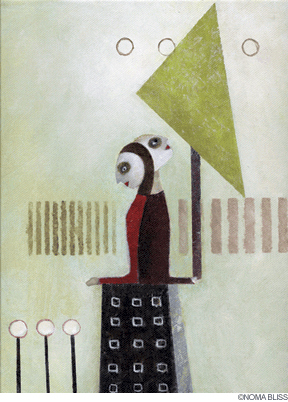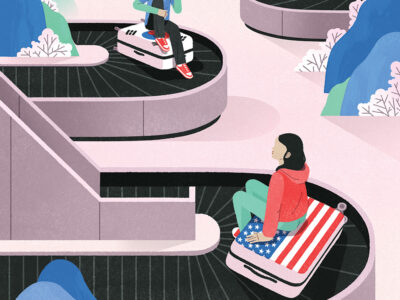
An Alaska native returns to find her old path gone.
By Anna Haigh | In Alaska, the last days of August are always cold. Winter usually begins at the end of September and lasts until April at the earliest, followed by three bright months of summer. It’s only fall that is so temporary, so undecided. Fall is a matter of weeks, even days, filled with chilly, sunny afternoons and yellow leaves scattered across dusty dirt roads. Long, black tarps are pulled from musty sheds and dark garages to be thrown over garden beds in case of frost. We gather wooden bowls and metal strainers to harvest the last tomatoes and snap peas from the greenhouse. When the first snow falls, the trees bend deeply under the weight and the leaves still stuck to the branches flicker underneath the snow.
I went home last summer at a time when the past seemed to be slipping away before I could grasp exactly what was happening. I had already spent three years at the University of Pennsylvania adoring the big city life. I loved the constant motion of it all, and the beautiful bustle of Philadelphia: the lurching buses and the clattering bicycles, the late-night dinners downtown, and the frantic energy of Penn’s campus at all hours of the day. Yet I was still clinging to elementary-school friends and distant memories, because the barrier between everything to come and all that had gone before seemed so definite, and growing up was terrifying. At least I had a place to go back to, a home, even if the fall was always bittersweet.
In August, the woods above my house are thick with the rich smell of slow-rotting low bush cranberries, pungent brown mushrooms, and decomposing leaves. It smells like fall to me, even without seeing the aspen and birch trees throwing off yellow leaves in the wind or the orange bear-berries falling softly off tiny branches sticking out of the tundra. A small trail winds upwards through the woods, marked by muddy footprints and fading moose tracks. In these woods I can remember snowshoeing through the deep snow with my parents, hearing nothing but dead tree limbs cracking underneath us and the soft sound of our voices. I can remember mud pies, secret forts, and hidden caves, and the rusty metal mailbox placed under a large spruce tree that I used for covert correspondence. I can remember the summer, when the trees swayed gently in the sunshine and I took picture after picture of the branches against the sky.
Flying into Fairbanks, looking out the small airplane window, I see only empty tundra. It seems to spread out infinitely, until suddenly the open space reaches sloping hills dotted with black spruce and marked by the tangled, thin lines of dark, winding rivers. Still, there are no houses, no buildings, just this vast expanse of nothingness. As we fly closer, the first homes and cabins appear high on hills and deep in low valleys. The small town appears almost as a mirage amid the emptiness. We bump noisily to the ground, and everyone shuffles out towards the baggage claim. Half the passengers are dressed in standard tourist attire (sweatshirts printed with flowers and bucket hats). The other half are obviously locals, wearing polar fleece and running shoes with dingy laces and torn soles. In the Fairbanks International Airport, there are two small conveyor belts to carry the mix of duct-taped duffel bags and square suitcases, 10 gates, and four rental-car counters where no one is ever waiting. I enter this scene, dazed from the jet lag and the strange familiarity of it all.
Since I left for college, coming home has been difficult. My city-self and my home-self don’t ever align exactly, leaving me to consider why I left this place and why I always return. My parents are late as usual—almost half an hour—but I don’t mind. They smile and talk loudly with friends who are also waiting for luggage. My dad’s mustache is graying around the edges, as is my mom’s dark hair, and I feel like crying. After I’ve collected my two oversized suitcases, we walk into the parking lot, where everyone heads to trucks or tour buses, discussing the recent wildfires, and husky dogs trapped in trucks get to leap out and run around the parking lot. The man at the gate of the lot takes our ticket and a dollar and hands back a receipt and a dog treat.
On one of those chilly late August days, after I’ve been home for awhile, I take a walk up the trail in the woods above my house. I am absorbed by the sounds of my footsteps in the mud and the smell of the low bush cranberries and ripe rose hips. And then there it is: Among the aspen and the birch, this glaring whiteness, shining in between the branches far in front of me. I breathe deeply, trying to figure out what could so brightly reflect the sunlight, what could be so unnaturally white, in the middle of this wilderness. Instead of spruce trees at the end of the trail, there is now a large gravel road. The road spreads down the hill and also steeply upwards: wide, barren, and menacing. It seems to be near the path I always take, the path that, if you headed in the right direction, would be shady and cool, lined by leaning birch trees. If you turned left on the path, and walked for awhile, you could see sunlight ahead of you, delicately spreading into a meadow, which is mostly just a small clearing covered in flattened grass and tree stumps. It was this spot that I loved more than any other place in the whole world. Standing on top of the road, I can no longer recognize where I am or what used to be at this place in the forest. I feel as if everything is coming undone.
It’s quiet on the new road: no cars, no mailboxes, and no houses. There is just this massive road in the middle of things. The only thing I can do is follow it up the hill. My feet scrape harshly against the gravel, and I am overwhelmed by how huge the road seems next to the forest. I can see my old path torn up by a new power line and also the foundation of a house, and the ugly tracks of heavy trailers. There are no longer any leaning birch trees. At the end of the road, I find that most of the path has disappeared. I can still see the place where the sunlight starts to seep into the meadow, but it’s not nearly enough when almost everything else is gone.
I was born on the kitchen floor of a small, shingled house on a cold March morning. This house was designed and built by my mother on five acres of land. The house had an outhouse and a small, pink plastic tub and the rest I can’t remember. When I was a baby, my dad would take me cross-country skiing, just the two of us. In a picture I still have, I fit inside a tiny blue backpack and wore a white knit hat. My dad was smiling and I looked so happy even though my cheeks were flushed from the cold.
Once I arrived at Penn, I clung desperately to my memories of Alaska, because on the East Coast it was the only thing that truly made me feel different. If I stopped believing that all the good in the world was wrapped up in freshly fallen snow, and the glow of sunlight on the horizon in the middle of a December afternoon, I felt I would be forced to give in to an entirely new set of ideals. My values would be rooted in gritty city streets instead of winding dirt roads.
After living in a city for four years, I’m not sure I will ever find permanent happiness in an apartment with a doorman and an elevator, with a coffee shop around the corner. In a city, the buildings are high enough to block the sky, and there’s so much light that you can’t see the stars. It still seems so unnatural to me that all of the trees are locked up in dirty concrete, flowers are contained in pots on windowsills, and hills are wrapped in pavement. There may be something strange, as well, about a place where no one wears suits or ties, and everyone has a shed full of rusty tools and an old car on their extra acre or two. But the fact is that nothing in Fairbanks is really odd at all when you’ve lived through 40 below zero and seen the sun shining on the river much too late at night during the long days of summer.
Staring across the new white road in the middle of my woods, I am lost. I turn around and head back towards the swaying aspen and the birch because I can’t bear standing there any longer.
Anna Haigh C’05 graduated in May. She was a beat reporter for The Daily Pennsylvanian, and a member of Bloomers, Penn’s all-female sketch comedy group. She works as a reporter for the Keene Sentinel in New Hampshire and made a trip back to Fairbanks after graduation for another walk in the woods.




